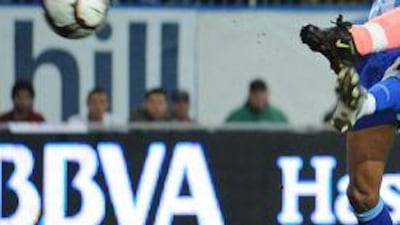Xerez grabbed their first point of the season on Sunday in Barcelona following a 0-0 draw at Espanyol. "It's not much, but the point will be a boost for morale," said a satisfied Xerez coach Jose Angel Ziganda. "The players gave their all and it could be a turning point for us. Next Sunday we'll play with more confidence." Xerez could have won 16-0 and the news would not have made headlines this weekend in Barcelona.
The fortunes of Barca dominate and while their perfect start this season has yielded many positive stories, the sports pages over the weekend were filled with the kind of press that the treble winners can do without. Pep Guardiola said recently it was not what happened on the pitch, but off it, which concerned him most this season. Guardiola is one shrewd operator who understands all the mystifying nuances of the club better than any outsider, and we will come to why he said that later.
On the field, Barca continue to thrill. Zlatan Ibrahimovic has silenced the many doubters who questioned his purchase and the giant fee in the summer. On Saturday in Malaga, he became the first Barca player to score in the five opening league games. "Ibrahimovic doesn't complain if he's thrown on," opined Guardiola. "More important than the goals he scores are the various alternatives he gives us in attack."
His partnership with Lionel Messi is thriving and the free-scoring pair look likely to contest with Cristiano Ronaldo and David Villa for the Pichichi this season (the award given to the Primera Liga's top scorer). But Ibrahimovic's exploits were marginalised by what some in the media are calling "Barcagate". After serving two terms as club president, the mandate of incumbent Joan Laporta expires at the next elections in 2010. Laporta took charge in 2003 when Barca were in disarray and debt. He has overseen a transformation in which Barca have won two European Cups and played the best football in the world. Several candidates are jockeying to take over as president, including some already at the Camp Nou.
News broke at the weekend that Laporta knew that private detectives have been spying on four potential candidates - all of them fellow directors. It confirmed the omnipresent culture of suspicion at Camp Nou, where the shifting plates of power continue to undermine and baffle the most successful football strategy on the planet. "There are certain people who want to destabilise this club in the most successful era in its history," said Laporta, by way of justification. Barca chief executive Joan Oliver added that the surveillance had been for "the protection" of those being spied on, "in case they had anything in their private or professional lives that may be used against them".
Oliver and Laporta would like to see Barca's next president promoted from within, but the favourite remains Laporta's former running mate and vice- president Sandro Rossell, the former Nike employee who was largely responsible for bringing Ronaldinho to the club in 2003. At a time of economic uncertainty for Barca, that signing was crucial. David Beckham had been offered a move to the Camp Nou but such was the Catalans' stock, he did not even return the call. Barca beat Manchester United to Ronaldinho's signature and their fortunes improved almost immediately.
Rossell and Laporta fell out and the former stepped down from his role as vice-president of sports in June 2005, accusing Laporta of betraying his original election promises. He will stand next year after charging Laporta's regime with "not being independent or transparent or democratic". It is a case of Catalans falling out, egos clashing and power struggles, but it damages what many outsiders see at the perfect system for club ownership. Barca are viewed as being democratic and fan owned.
Many British clubs aspire to the same model rather than being mortgaged to the hilt with debt like Manchester United or Liverpool, but it has serious flaws, all of them springing from human error. Ego, a lust for power and prestige see so many changes at the club that there is a constant revolving door. Nepotism is rife because important jobs get given to trusted allies. I know one former Barca employee who mentioned Rossell's name in a positive light recently. She was very quickly pulled aside and told not to speak that name in the building. She was dismissed weeks later, her job going to the cousin of someone in power. She is now volunteering as part of Rossell's election campaign.
Barca officials are keen to talk of the virtuous circle of success when they are invited to chair respected talks in London or New York, less so of the vicious circle of instability. Rival newspapers support rival factions, with damaging stories leaked to undermine players or employees the club want out. Politics affect every club and every company, but what is staggering about Barca is that they manage to be so successful in spite of what is going on behind the scenes.
In Guardiola they have a coach who understands not only the playing side, but the club and its politics better than anyone. And that makes him more indispensable than any player. Andy Mitten lives in Barcelona and has written about La Liga for more than a decade for FourFourTwo and The Independent amitten@thenational.ae


